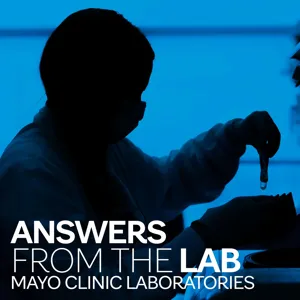(00:32)
Thanks for that introduction, Dr. Pritt. Today, we're actually going to be discussing T-cell lymphomas with Dr. Andrew Feldman. But before we really get started talking about this disease state, Dr. Feldman, could you provide us with a little bit of background about you and your role here at Mayo Clinic?
(01:10)
So at your work at Mayo clinic, you’re involved in the clinical side and that you're reading all of these patient cases as a meta-pathologist, but you also have a research focus as well. Is that specific to T-cell lymphomas?
(01:38)
That's interesting. That gives you a very unique perspective being that you're involved kind of in both sides of that. So as we talk about T-cell lymphoma, can you just give myself and our listeners kind of a brief overview of this disease state?
(03:48)
So, Dr. Feldman, I find it really interesting as you, you kind of talk about this disease state. I didn't realize there were 30 subtypes of T-cell lymphoma. I mean, that does definitely add to the complexity of this. So can you talk to me really about what are the different tests and assays that you use to sub classify into those 30 types and give our patients an accurate diagnosis?
(06:19)
This never ceases to amaze me about the amount of pathology and hematology and hematologic malignancies in general. There's no one test that answers the questions that we have for these patients. You kind of have to work your way down, putting all of these different pieces together. And I always think about it like a puzzle. So as you're going through and in answering these questions and you put this puzzle together for each patient, when should patients be having this testing performed? Do we do it at diagnosis? Are we following these patients? Kind of talk to me about that process as the patient comes in to see their oncologist for these diseases.
(07:39)
So Dr. Feldman, it's interesting that you talked about all of these tests that we perform to try to accurately diagnose these patients and that we're using them to give the clinician all of those answers that they need to treat their patients. As we come up with that final diagnosis and we give the clinician their answer, how are those results being used in patient care? I've seen a lot of movement in the marketplace lately with new therapies, new gene findings. What are those answers that we're giving those clinicians doing for those patients in the long run?
(11:10)
Just so interesting to me, all the complexities of this and the nuances that go into making sure that that patient gets put on the right therapy that is actually beneficial for them and not harmful in some cases. So last question, just because it's kind of a hot topic right now in the oncology world in general. So, are we monitoring these types of lymphoma patients right now for any sort of minimal residual disease or what kind of monitoring happens for these patients during the course of therapy,
(12:08)
Oh, that's very interesting. And I look forward to that, especially hearing you talk about how some of these therapies are being very successful for these patients. It'll be good to see what does that progression-free survival look like and what does that patient quality of life right after they've gone through these therapies. I really enjoy hearing that we're having these increased successes. So one last question for you before I let you go, you've done a lot of research in the T-cell lymphoma space. It's obviously something that's really near and dear to your heart. You also see a lot of consults and our team sees a lot of consults on T-cell lymphomas, just because of our expertise in this area. Just really quickly tell me about all of the work that you've done. What's the one thing that really stands out. She was like, this was that thing that you found or that, that driver of what, what brings you to work every day that you just are really always excited.

